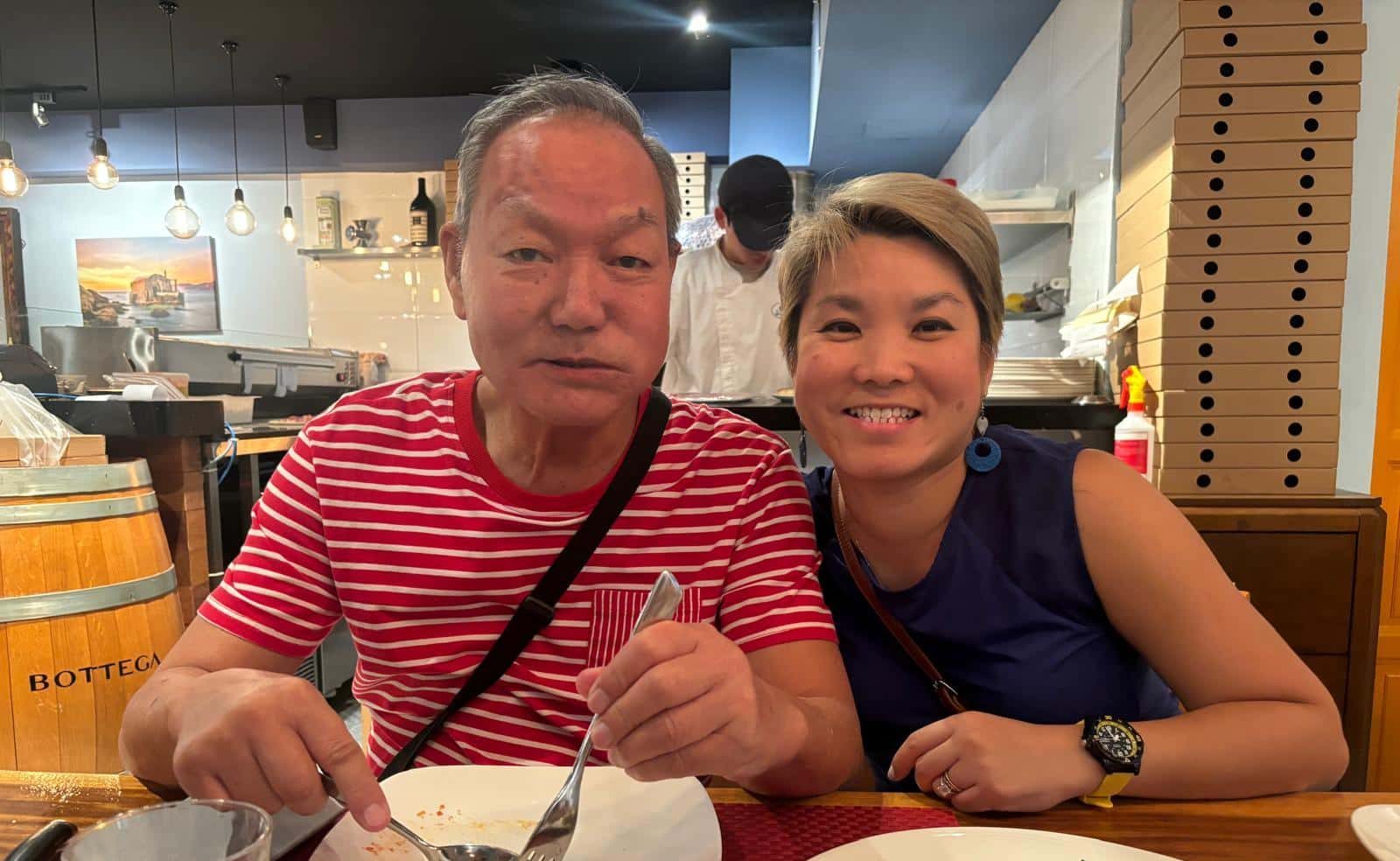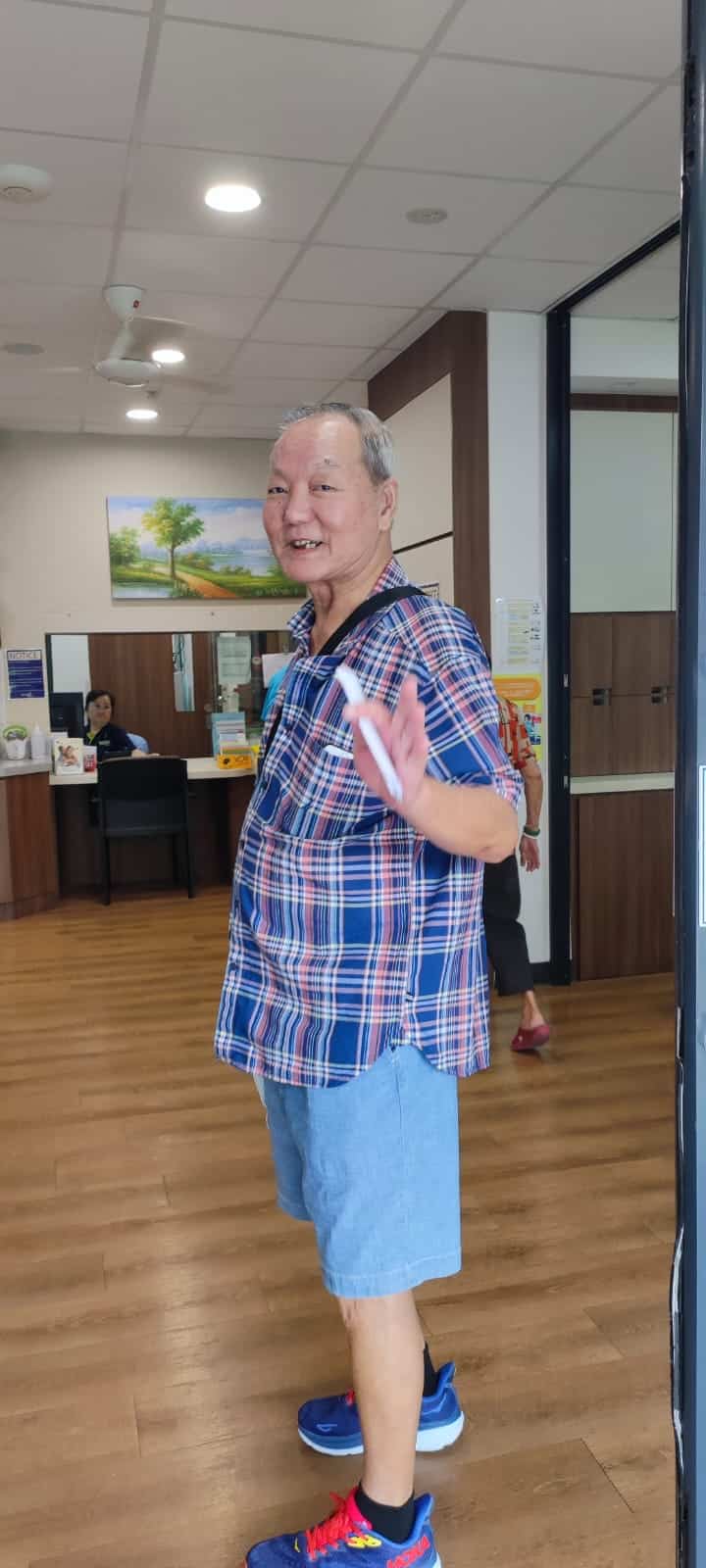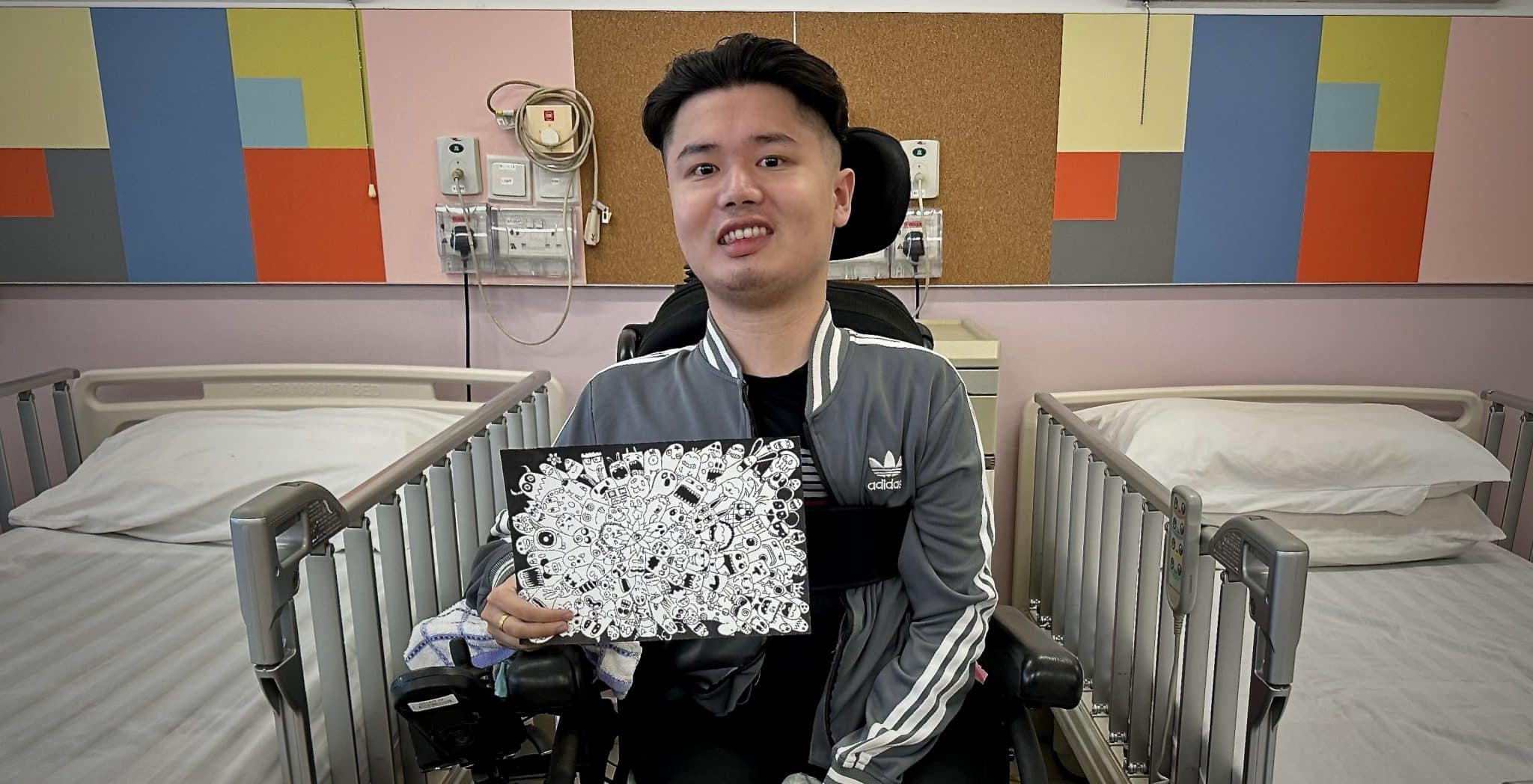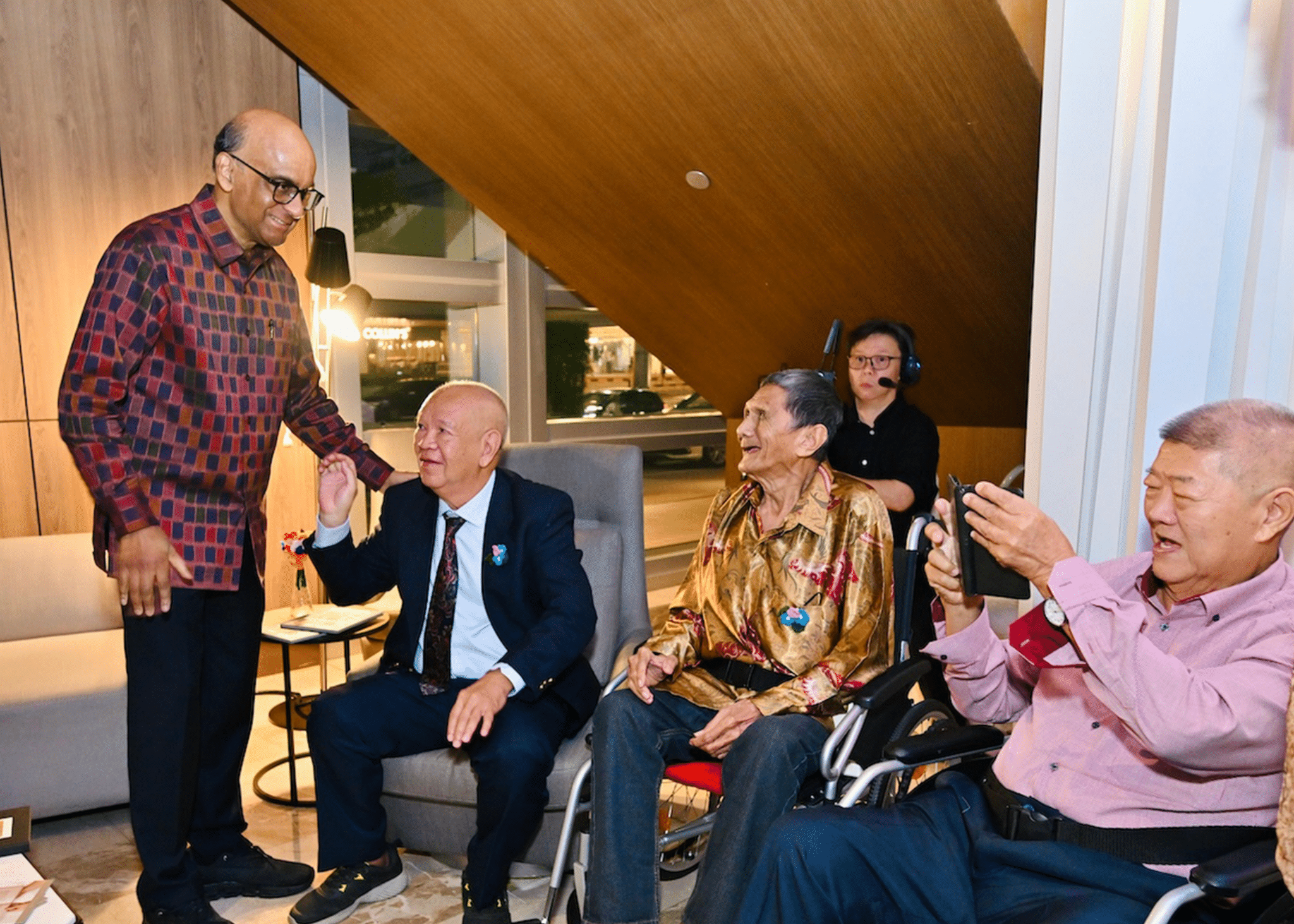“When I feel drained, I remind myself that this is a ministry to God”: Mum who cares for dad with dementia and son with special needs
by Christine Leow // September 16, 2024, 12:40 pm

"I do what I can for him as a daughter, not for me but for the glory of God. It is the thing that sustains me,” said Shirley See (right), who is the main caregiver to her dad with dementia, and her 18-year-old son who has a rare congenital disorder. All photos courtesy of Shirley See.
Most mornings, Shirley See is busy getting everyone to where they need to be.
First, she has to ensure that her four children – a son aged 18, a pair of twin boys aged 17 and a daughter aged 13 – get to school on time.
Then she has to think up creative ways to encourage her father, who has dementia, to go to a St Luke’s ElderCare (SLEC) senior care centre so he will not spend his days “staring into space”.
“He would rather not attend. His face is very black and I have to pray very hard that he is okay with going,” said Shirley, 45.
She takes the 75-year-old out for breakfast first, hoping it will make the trip to the centre more pleasant.
“The mental stress is huge. Each time I try something new, I have to really keep praying. I pray until he walks into the centre. Each time he goes, I will say, ‘Thank You God and praise God.’

Mr See waving good-bye before he enters the senior care centre.
“It is really God making him do it because despite his nature and (the fact that) he is so unhappy, he still goes.”
A ministry of love
Her father, Mr See Swee Keong, is not the only person that Shirley cares for at home.
Her eldest son, Joel, was born with DiGeorge Syndrome, a rare congenital disorder that causes several body systems to develop poorly because of a missing part of Chromosome 22. Joel also has other health issues and learning difficulties.

Shirley (bottom, right) with her family and her father (left) and mother (back row, second from right).
To care for him, Shirley gave up her job and the family employed two domestic helpers.
Now that she is her father’s main caregiver – her mother is 74 and in frail health – she has to care for two people with special needs at home.
“I won’t be able to do this if I am not a Christian,” she said.
“When I feel drained, I remind myself that this is a ministry to God. I do what I can for him as a daughter, not for me but for the glory of God. It is the thing that sustains me.”
Gone one afternoon
Mr See was officially diagnosed with dementia in July after he went for his regular walk and did not come home after several hours. When a search came up with nothing, the family lodged a police report.
“That was the second time he disappeared,” said Shirley, 45.
He had walked from Serangoon, where they lived, to Seletar, about 8km away.
Mr See eventually came home on his own at 2am after being gone for some 14 hours, but the family could not get him to tell them what had happened.
“We brought him to the hospital to get him checked up. An MRI was done and we officially found out that he had dementia.”
When he was more rested, they managed to put bits and pieces of the story together: He had walked from Serangoon, where they lived, to Seletar, about 8km away.
One after another
His latest diagnosis had come on the back of several medical challenges.
In 2015, Mr See had his bladder removed because of cancer. Since then, he has relied on a urostomy bag to remove his urine.
In 2017, his gait became unsteady and he began to exhibit “weird behaviour”.
“After the operation, his personality changed. He became more withdrawn and not communicative.”
“On a family holiday in Korea, it was snowing, freezing. He opened the windows at the ski resort and covered himself with a blanket with the aircon on full blast. Then he mistook someone else for my husband,” Shirley recalled.
When Mr See fell in the toilet after the holiday, the family brought him to the hospital. The doctor discovered a tumour in his frontal lobe, which had to be removed in surgery.
The frontal lobe controls, among other things, social skills, speech and behaviour.
“After the operation, his personality changed. He became more withdrawn and not communicative, which was why it was hard for him to tell us where he went when he went missing,” said Shirley.
Over time, he also developed some behaviour tics that made her suspect that something was not right. But it was not enough to raise alarm bells.
A delicate balance
Life changed after her father’s dementia diagnosis. Shirley went into hyper-alert mode.
She took her father with her whenever she ran errands so that he would have little opportunity to wander off on his own. She also locked the gates of the house, effectively denying him his daily walks.
“You remind him to take his medicine, and he claims he has, but they are still in the box.”
“He was really upset when he found out we had locked the gates,” she said.
Mr See, who has no problems communicating normally, could not understand the vigilance. Disagreements ensued.
In the end, Shirley decided to give him more space. He and his wife live just one floor above Shirley, and she allows him to go up and down between floors unsupervised. But a helper always follows him on his walks.
“It’s a delicate balance,” Shirley said.
While Mr See is very independent, his flagging memory is proving to be “a bit of a headache” for Shirley.
“He will shower and will not use soap and shampoo. He will tell you he has showered, but he actually hasn’t. You remind him to take his medicine, and he claims he has, but they are still in the box.”
Meaningful support
Among these challenges, convincing Mr See to go to St Luke’s ElderCare (SLEC) senior care centre remains the toughest, said Shirley.
Apart from her faith, she also relies on the support that SLEC has offered.
“I’m very thankful that St Luke’s sends updates about my dad and makes the effort to get him more involved in the activities,” she said.
“I was told that they had tried to get my dad to play his favourite brick game on a tablet instead of his phone. I believe this was done so that he wouldn’t be glued to his phone, and it’s a varied way of getting him involved.”

Her father is a changed man after he comes home from the senior care centre, says Shirley.
She also noted that her father often “comes back like a different person, so light-hearted and chirpy”.
“I believe this is the work of God and the people at St Luke’s that has caused the drastic change in my dad’s moods.”
ST LUKE’S ELDERCARE COMMCARE SYMPOSIUM 2024
This Friday (September 20), St Luke’s ElderCare’s annual symposium will feature two distinct tracks that run concurrently.
Track 1 – Dementia and Spirituality: Building Connections, Conversations and Collaborations
Come explore a holistic eldercare approach that honours each person’s spirituality and examine how dementia affects faith.
Discover religious and spiritual practices that offer strength and hope. Learn about effective communication in spiritual connection and gain insights into promoting volunteerism and advocacy in dementia care.
Speakers
Bishop Emeritus Dr Robert Solomon
The Methodist Church in Singapore
Sister Geraldine Tan
Former Executive Director
St Joseph’s Home
Catholic Welfare Services
Reverend Dr Norman Wong
Head, Chaplaincy
Methodist Welfare Services
Adj A/Prof (Dr) Kenny Tan
Chief Executive Officer
St Luke’s ElderCare Ltd
Track 2 – Wounds to Wellness: Pioneering Paths to Healing
Listen to expert speakers share about innovation in vascular health, wound hygiene and dive into topics such as CSI on vascular wound cases, care of biliary drain tube and percutaneous nephrostomy tube, and the management of complex and chronic wounds.
Speakers
Adj A/Prof Png Gek Khen
Chief Nurse
Advanced Practice Nurse (Geriatric)
Changi General Hospital
Adj A/Prof Dr Vikram Vijayan Sannasi
Head, Division of Vascular Surgery
Director of the Vascular Diagnostic Laboratory
Senior Consultant Surgeon
Vascular and Endovascular Surgery
Department of General Surgery
Ng Teng Fong General Hospital
Dr Alan Yap
Head of Wound/Stoma Care Unit
Queen Elizabeth Hospital
Kota Kinabalu, Sabah Malaysia
Date: September 20, 2024
Time: 8.30am-4pm (Track 1)
8.30am-5pm (Track 2)
Cost: S$30 (Track 1)
S$100 (Track 2)
Venue: SIM Global Education
461 Clementi Road
Singapore 599491
About the organiser:
The SLEC CommCare Academy aims to be a thought leader in eldercare training and education, and a premium training provider in the community care sector. Innovative pedagogy is employed to deliver a comprehensive range of educational programmes, especially in areas such as palliative care, skin and wound care, dementia care and rehabilitation care.
RELATED STORIES:
3 ways we can redeem dementia, instead of giving in to hopelessness
Time was running out … Would her dad say yes to Christ before dementia claimed his mind?
Yet not I but Christ in me: The rocky road to my dad’s conversion
We are an independent, non-profit organisation that relies on the generosity of our readers, such as yourself, to continue serving the kingdom. Every dollar donated goes directly back into our editorial coverage.
Would you consider partnering with us in our kingdom work by supporting us financially, either as a one-off donation, or a recurring pledge?
Support Salt&Light



